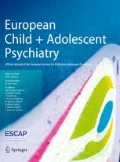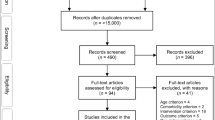Abstract
Subthreshold disorders, conditions with relevant psychiatric symptoms which do not meet the full criteria of a disorder according to the prevailing classification systems, have received increased attention recently. The current paper aims to present a systematic review of subthreshold attention-deficit/hyperactivity disorder (ADHD) in children and adolescents. Searching five computerised databases (Ovid MEDLINE, Psychinfo, PubMed, Scopus, Web of Science) with two categories of search terms [(1) subclinical; subsyndromal; subthreshold (2) ADHD] the authors examined the prevalence of subthreshold ADHD among children and adolescents, the comorbidity of subthreshold ADHD and whether there was already any impact of subthreshold ADHD on functioning. Before these questions were answered, the included articles were examined to see what kinds of definitions of child and adolescent subthreshold ADHD are used and what kinds of assessments are used for measuring subthreshold ADHD among children and adolescents. The results of the 18 articles included show that different definitions of subthreshold ADHD in children and adolescents exist, a large variety of instruments are used, the prevalence rate of subthreshold ADHD is wide-ranging (0.8–23.1 %), the comorbidity of subthreshold ADHD is high and there are several areas where subthreshold ADHD has a meaningful impact on functioning. All these suggest that focusing on subthreshold ADHD can be important in preventative interventions. The results of this systematic review support the dimensional approach of ADHD. Further research on uniform criteria of subthreshold ADHD is needed to support the inclusion of this condition in classification systems.

Similar content being viewed by others
References
Möller HJ (2008) Systematic of psychiatric disorders between categorical and dimensional approaches: Kraepelin’s dichotomy and beyond. Eur Arch Psychiatry Clin Neurosci 258(suppl 2):48–73
Okasha A (2009) Would the use of dimensions instead of categories remove problems related to subthreshold disorders? Eur Arch Psychiatry Clin Neurosci 259(suppl 2):129–133
American Psychiatric Association (1987) Diagnostic and statistical manual of mental disorders, 3 (revised) edn. American Psychiatric Association, Washington
American Psychiatric Association (1994) Diagnostic and statistical manual of mental disorders, 4th edn. American Psychiatric Association, Washington
World Health Organization (1993) ICD-10, the international classification of diseases. Classification of mental and behavioural disorders. Diagnostic criteria for research. World Health Organization, Geneva
American Psychiatric Association (2013) Diagnostic and statistical manual of mental disorders, 5th edn. American Psychiatric Association, Washington
Bertha EA, Balázs J (2013) Subthreshold depression in adolescence: a systematic review. Eur Child Adolesc Psychiatry 22:589–603
Brown RT, Freeman WS, Perrin JM, Stein MT, Amler RW, Feldman HM, Pierce K, Wolraich ML (2001) Prevalence and assessment of attention-deficit/hyperactivity disorder in primary settings. Pediatrics 107:E43
Scahill L, Schwab-Stone M (2000) Epidemiology of ADHD in school-age children. Child Adolesc Psychiatr Clin N Am 9:541–555
Danckaerts M, Sonuga-Barke EJS, Banaschewski T, Buitelaar J, Döpfner M, Hollis C, Santosh P, Rothengerger A, Sergeant J, Streinhausen HC, Taylor E, Zuddas A, Coghill D (2009) The quality of life of children with attention deficit/hyperactivity disorder: a systematic review. Eur Child Adolesc Psychiatry 19:83–105
Velő S, Keresztény Á, Szentiványi D, Balázs J (2013) Figyelemhiányos-hiperaktivitás zavar diagnózisú gyermekek és felnőttek életminősége: az elmúlt öt év vizsgálatainak szisztematikus áttekintő tanulmánya. Neuropsychopharmacol Hung 15:73–82
Balázs J, Gádoros J (2005) Komorbiditás a gyermekpszichiátriában: Valóban olyan gyakori a mániás epizód—ADHD együttes jelentkezése? Psychiatr Hung 20:293–298
Biederman J, Newcorn J, Sprich S (1991) Comorbidity of attention deficit hyperactivity disorder with conduct, depressive, anxiety, and other disorders. Am J Psychiatry 148:564–577
MTA Cooperative Group (1999) A 14-month randomized clinical trial of treatment strategies for attention-deficit/hyperactivity disorder. Arch Gen Psychiatry 56:1073–1086
August GJ, Ostrander R, Bloomquist MJ (1992) Attention-deficit hyperactivity disorder—an epidemiologic screening method. Am J Orthopsychiatry 62:387–396
Biederman J, Petty CR, Evans M, Small J, Faraone SV (2010) How persistent is ADHD? A controlled 10-year follow-up study of boys with ADHD. Psychiatr Res 177:299–304
Bussing R, Mason DM, Bell L, Porter P, Garvan C (2010) Adolescent outcomes of childhood attention-deficit/hyperactivity disorder in a diverse community sample. J Am Acad Child Adolesc Psychiatr 49:595–605
Bussing R, Porter P, Zima BT, Mason D, Garvan C, Reid R (2012) Academic outcome trajectories of students with ADHD: does exceptional education status matter? J Emot Behav Disord 20:131–143
Cukrowicz KC, Taylor J, Schatschneider C, Iacono WG (2006) Personality differences in children and adolescents with attention-deficit/hyperactivity disorder, conduct disorder, and controls. J Child Psychol Psychiatry 47:151–159
Lewinsohn PM, Shankman SA, Gau JM, Klein DN (2004) The prevalence and co-morbidity of subthreshold psychiatric conditions. Psychol Med 34:613–622
Rielly NE, Craig WM, Parker KC (2006) Peer and parenting characteristics of boys and girls with subclinical attention problems. J Atten Disord 9:598–606
Scahill L, Schwab-Stone M, Merikangas KR, Leckman JF, Zhang H, Kasl S (1999) Psychosocial and clinical correlates of ADHD in a community sample of school-age children. J Am Acad Child Adolesc Psychiatr 38:976–984
Shankman SA, Lewinsohn PM, Klein DN, Small JW, Seeley JR, Altman SE (2009) Subthreshold conditions as precursors for full syndrome disorders: a 15-year longitudinal study of multiple diagnostic classes. J Child Psychol Psychiatry 50:1485–1494
Airaksinen EM, Michelsson K, Jokela V (2004) The occurrence of inattention, hyperactivity, impulsivity and coexisting symptoms in a population study of 471 6–8-year old children based on the FTF (five to fifteen) questionnaire. Eur Child Adolesc Psychiatry 13(Suppl 3):23–30
Kadesjö B, Gillberg C (2001) The comorbidity of ADHD in the general population of Swedish school-age children. J Child Psychol Psychiatry 42:487–492
Malmberg K, Wargelius HL, Lichtenstein P,FV Oreland L, Larsson JO (2008) ADHD and disruptive behavior scores—associations with MAO-A and 5-HTT genes and with platelet MAO-B activity in adolescents. BMC Psychiatry 8:28
Malmberg K, Edbom T, Wargelius HL, Larsson JO (2011) Psychiatric problems associated with subthreshold ADHD and disruptive behaviour diagnoses in teenagers. Acta Paediatr 100:1468–1475
Fergusson DM, Boden JM, Horwood LJ (2010) Classification of behavior disorders in adolescence: scaling methods, predictive validity, and gender differences. J Abnorm Psychol 119:699–712
Cho SC, Kim HW, Kim BN, Shin MS, Yoo HJ, Kim JW, Bhang SY, Cho IH (2011) Are teacher ratings and parent ratings differently associated with children’s intelligence and cognitive performance? Psychiatry Investig 8:15–21
Gau SSF, Chiang HL (2009) Sleep problems and disorders among adolescents with persistent and subthreshold attention-deficit/hyperactivity disorders. Sleep 32:671–679
Gau SSF, Lin YJ, Cheng ATA, Chiu YN, Tsai WC, Soong WT (2010) Psychopathology and symptom remission at adolescence among children with attention-deficit-hyperactivity disorder. Aust N Z J Psychiatry 44:323–332
Kim HW, Cho SC, Kim BN, Kim JW, Shin MS, Kim Y (2009) Perinatal and familial risk factors are associated with full syndrome and subthreshold attention-deficit hyperactivity disorder in a Korean community sample. Psychiatry Investig 6:278–285
Kaufman J, Birmaher B, Brent D, Rao U, Flynn C, Moreci P, Williamson D, Ryan N (1997) Schedule for affective disorders and schizophrenia for school-age children-present and lifetime version (K-SADS-PL): initial reliability and validity data. J Am Acad Child Adolesc Psychiatr 36:980–988
Orvaschel H (1994) Schedule for affective disorder and schizophrenia for school-age children epidemiologic version. Center for Psychological Studies, Nova Southeastern University, Fort Lauderdale
Costello EJ, Edelbrock CS, Costello AJ (1985) Validity of the NIMH diagnostic interview schedule for children: a comparison between psychiatric and pediatric referrals. J Abnorm Child Psychol 13:579–595
Achenbach TM (1991) Manual for the child behavior checklist/4-18 and 1991 profile. Department of Psychiatry, University of Vermont, Burlington
Conners CK (1997) Conners’ rating scales: revised technical manual. Multi-Health Systems, North Towanda
DuPaul GJ, Power TJ, Anastopoulos AD, Reid R (1998) ADHD rating scale IV: checklists, norms, and clinical interpretation. Guilford, New York
Angst J, Merikangas K (1997) The depressive spectrum: diagnostic classification and course. J Affect Disord 45:31–39
Cuijpers P, De Graaf R, Van Dorsselaer S (2004) Minor depression: risk profiles, functional disability, health care use and risk of developing major depression. J Affect Disord 79:71–79
Eaton WW, Badawi M, Melton B (1995) Prodomes and precursors: epidemiologic data for primary prevention of disorders with slow onset. Am J Psychiatr 152:967–972
Horwarth E, Johnson J, Klerman GL, Weissman MM (1992) Depressive symptoms as relative and attributable risk factors for first-onset major depression. Arch Gen Psychiatr 49:817–823
Lewinsohn PM, Solomon A, Seeley JR, Zeiss A (2000) Clinical implications of “subthreshold” depressive symptoms. J Abnorm Psychol 109:345–351
Wells KB, Burnam A, Rogers W, Hays R (1992) The course of depression in adult outpatients. Arch Gen Psychiatr 49:788–794
Pincus HA, McQueen LE, Elinson L (2003) Subthreshold mental disorders: nosological and research recommendations. In: Phillips KA, First MB, Pincus HA (eds) Advancing DSM: dilemmas in psychiatric diagnosis. American Psychiatric Association, Washington, pp 129–144
Acknowledgments
This work was supported by the Hungarian Scientific Research Fund (Hungarian abbreviation: OTKA), Grant agreement number is K-108336.
Conflict of interest
The authors declare that they have no conflict of interest.
Author information
Authors and Affiliations
Corresponding author
Rights and permissions
About this article
Cite this article
Balázs, J., Keresztény, Á. Subthreshold attention deficit hyperactivity in children and adolescents: a systematic review. Eur Child Adolesc Psychiatry 23, 393–408 (2014). https://doi.org/10.1007/s00787-013-0514-7
Received:
Accepted:
Published:
Issue Date:
DOI: https://doi.org/10.1007/s00787-013-0514-7




